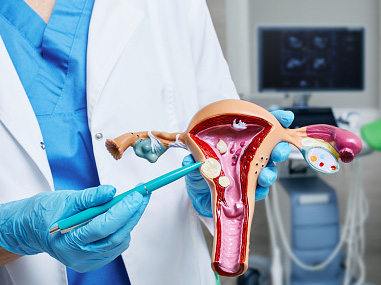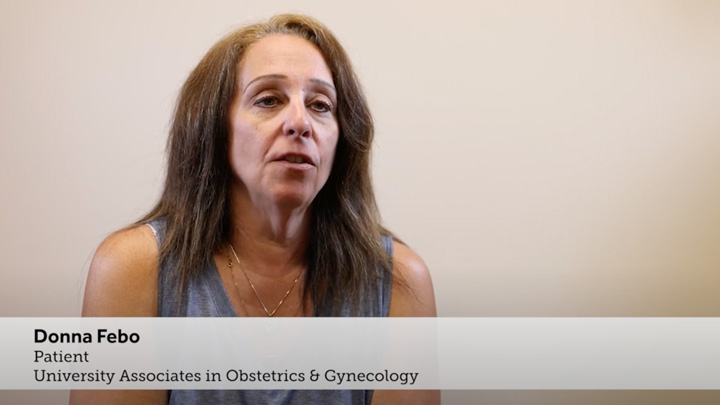Are you experiencing heavy periods or pelvic pain? If so, you may be suffering from a common issue affecting millions of women: uterine fibroids. Stony Brook Medicine can diagnose your condition and provide treatments to get you back to feeling your best.
Sonata: Next-Generation Fibroid Treatment
As Long Island’s premier academic health system, Stony Brook Medicine is the only facility in Suffolk County offering the newest technology in the treatment of uterine fibroids: Sonata.
Resulting in exceptional results for over 90% of our patients, Sonata is an outpatient procedure performed in our Ambulatory Surgery Center. You may be a candidate for Sonata if you have fibroids that are affecting your quality of life.
This incisionless treatment option uses radiofrequency ablation to shrink fibroids. Clinically proven to reduce fibroid symptoms, including heavy menstrual bleeding or pelvic pressure, Sonata can address a wide range of fibroid types and sizes, and treat multiple fibroids at one time. The Sonata procedure typically takes less than one hour, depending on the number and size of fibroids treated.
Schedule an Appointment
To see if Sonata is the best treatment option for your condition, schedule an appointment with one of our board-certified gynecologists today.
Call (631) 444-4686.
Benefits of Sonata include:
- Fast recovery: Many women return to normal activity the next day
- No incision: The fibroids are treated from inside the uterus, so there is no cutting or scarring.
- Uterus preserving: Unlike a hysterectomy, treatment with the Sonata system does not eliminate the possibility of pregnancy.
Since having the Sonata surgery, my life has gotten so much better. This, for me, was a lifesaver.
— Donna Febo, Stony Brook Medicine Patient
What are Fibroids?
Fibroids are noncancerous tumors that grow in and around the uterus. You can have one or many of these tumors, ranging in size from extremely small to grapefruit-sized. Fibroids are the most common gynecological tumors and consist of three major types:
- Subserosal fibroids grow on the outside of the uterus.
- Intramural fibroids grow within the muscular wall of the uterus.
- Submucosal fibroids protrude into the endometrium, or the uterine lining.
Fibroid Symptoms
You may have fibroids if you notice any of the following:
- Heavy menstrual bleeding
- Bleeding between menstrual cycles
- Pelvic pain or pressure
- Constipation
- Frequent urination
- Pain during intercourse
- Difficulty getting pregnant
- Back pain or leg pain

Are You at Risk for Fibroids?
While fibroids can affect any woman of childbearing age, certain factors can increase your chance of getting them:
- Age: Fibroids are most common between the ages of 30 and 50.
- Race: Black women are more likely to develop fibroids.
- Family history: Having a close relative with fibroids raises your risk.
- Weight: Obesity is linked to an increased risk of fibroids.
- Hormonal factors: Early menstruation and not having children play a role.
Diagnosing Fibroids
If you’re experiencing any of the symptoms listed above, speak with your gynecologist as soon as possible, instead of waiting until your annual exam. Addressing fibroids when they’re smaller makes them easier to manage. At Stony Brook Medicine, we typically diagnose fibroids using pelvic ultrasound. Ultrasound allows us to determine the presence, size, and location of your fibroids, which impacts the treatment options available to you.
Treatment Options
We understand the impact fibroids can have on your life. Whether dealing with heavy periods or facing excessive pain, our skilled team will explore all options, including the Sonata system mentioned above, to provide personalized care and a comprehensive treatment plan.
We offer three approaches to treating your fibroids:
Medical Management
To control bleeding symptoms, we can provide hormonal interventions to help shrink fibroids and better regulate your periods. Medical management solutions include hormonal IUDS and hormonal contraceptives, such as birth control pills.
Minimally Invasive Procedures
In many cases, your condition can be resolved with a minimally invasive procedure, which involves smaller incisions and quicker recovery time. These procedures can be done in an outpatient setting or with a short hospital stay.
Types of minimally invasive procedures we perform include:
- Sonata transcervical fibroid ablation: Uses an intra-uterine ultrasound probe to target and then ablate fibroids.
- Uterine Artery Embolization (UAE): Blocks blood flow to fibroids, shrinking them over time (this can be performed by our Interventional Radiology colleagues).
Surgery
Surgery is the most traditional treatment for removing fibroids. Options include:
- Hysterectomy: Removes fibroids and the entire uterus.
- Laparoscopic or robotic myomectomy: Removes fibroids by making a few small cuts near your belly button and then inserting surgical tools through the incisions to reach and take out the growths.
- Hysteroscopy: Inserts a tiny camera into the uterus to remove small fibroids within the endometrial cavity.
- Open Surgery: Performed when fibroids are too large to remove through minimally invasive procedures.









